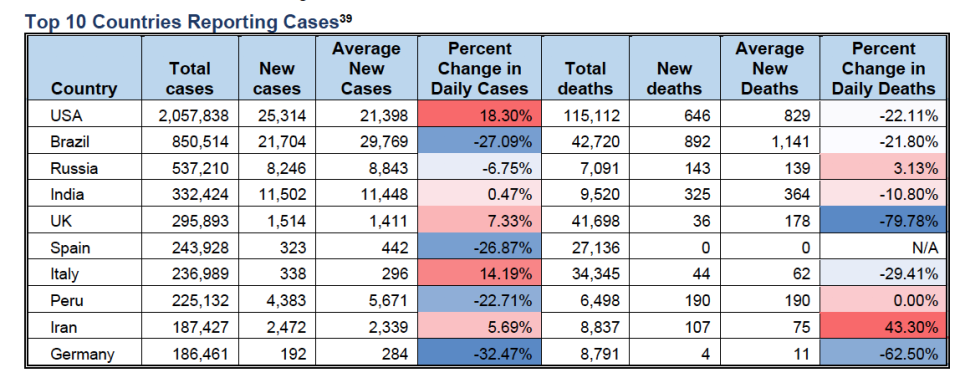Leaked CDC document contradicts Pence claim that U.S. coronavirus cases 'have stabilized'
WASHINGTON — Even as Vice President Mike Pence wrote in a Wall Street Journal op-ed published Tuesday that coronavirus cases in the U.S. “have stabilized,” a document produced that same day by the Centers for Disease Control and Prevention and circulated to the other government agencies warns that infections in the U.S. have increased more than 18 percent.
“Cases have stabilized over the past two weeks, with the daily average case rate across the U.S. dropping to 20,000 — down from 30,000 in April and 25,000 in May,” Pence wrote Tuesday in his op-ed, which defended President Trump’s response to the pandemic.
Yet the CDC’s June 16 COVID-19 Response Update appears to paint a darker portrait of the state of the pandemic, with maps showing many counties in the U.S. experiencing increasing rates of the coronavirus. Of the figures highlighted, a chart shows that the U.S. rate of increase for the coronavirus using a three-day average is 18.3 percent. By comparison, two of the hardest-hit countries have declining rates based on this same three-day average: Brazil’s cases came down 27 percent, and Russia’s have decreased by almost 7 percent.

Neither the CDC nor Pence’s office responded to a request for comment. Pence remains the head of the White House coronavirus task force, which has all but faded from view in recent weeks. The task force’s last public briefing was in late April, though its members still meet regularly.
In a press briefing Friday, CDC Director Robert Redfield indicated that some of the increasing case numbers result from more widespread testing at facilities that have had large outbreaks, such as nursing homes, prisons and meat-processing facilities, but even that is “not explaining everything.”
The CDC update is marked as an “internal” government document, meaning it is not intended to be released to the public. Yahoo News obtained a copy of the report, which was distributed within the government the same day Pence’s op-ed was published.
The explanatory text accompanying the CDC maps also appears to contradict Pence’s optimistic message about the coronavirus. “There remains a large number of counties whose burden continues to grow or are in an elevated incidence plateau, including in Wyoming, Iowa, Washington, California and in parts of the Southwest and Southeast,” the CDC document reads in a caption accompanying a map showing large swaths of the country as either in “elevated incidence” or “rebound” for coronavirus cases.
A separate map showing the number of new cases notes that “elevated incidence of disease during the past 2 weeks remains widespread, including in the Northeast (and the New York City area), the Southwest, the Southeast, DC, areas around Chicago, and parts of California, Minnesota, Iowa, Washington.”

Pence’s op-ed also appeared on the same day the Wall Street Journal ran an article based on an interview with Dr. Anthony Fauci, the country’s top infectious disease expert, who sounded a far more pessimistic view about the country’s progress than the vice president.
“People keep talking about a second wave,” Fauci told the newspaper. “We’re still in a first wave.”
Fauci also disputed the idea that testing alone accounts for the recent rise in U.S. cases, a claim regularly made by President Trump.
Despite the divergence regarding whether COVID-19 cases in the U.S. have “stabilized,” Pence and the CDC appear to be in sync when it comes to figures showing significantly declining death rates. Pence wrote that “in the past five days, deaths are down to fewer than 750 a day, a dramatic decline from 2,500 a day a few weeks ago — and a far cry from the 5,000 a day that some were predicting.”
According to the CDC documents, death rates have declined by about 22 percent, based on the prior three-day average. New deaths are down to 646, even lower than Pence noted, though the average number of new deaths, the CDC document says, is at 829.
Jana Winter contributed reporting to this story.
Cover thumbnail photo: Doug Mills/The New York Times/Bloomberg via Getty Images
_____
Read more from Yahoo News:


